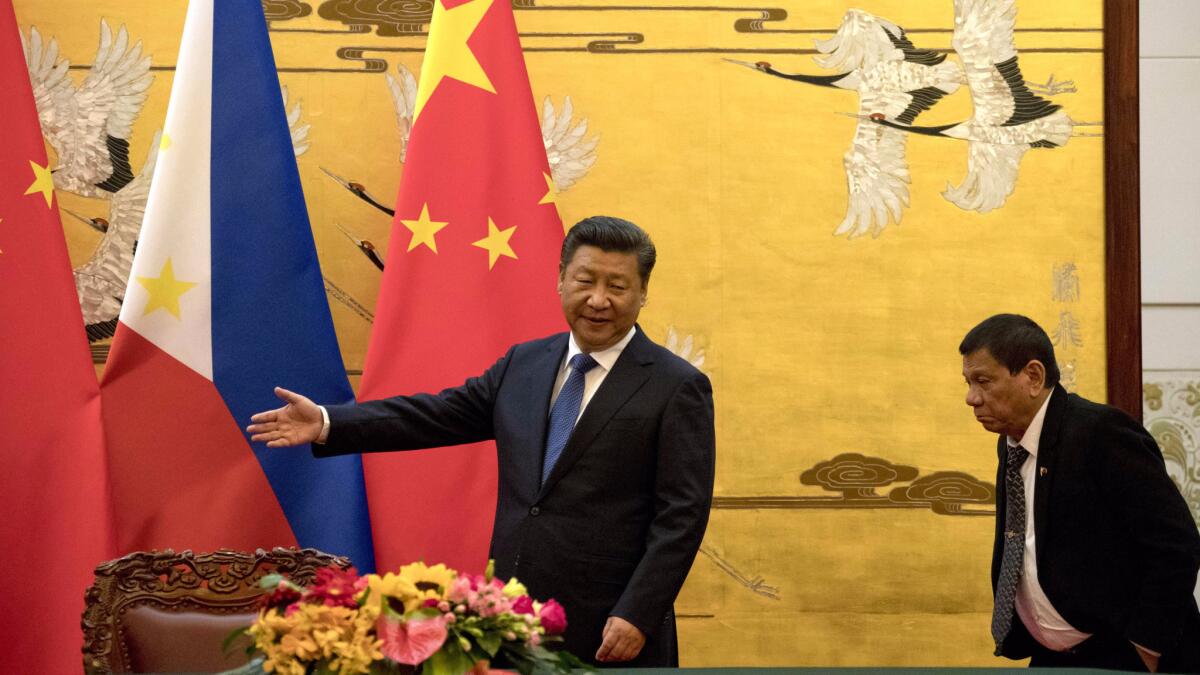After a dispute over the South China Sea, the Philippines and China agree to resume talks

- Share via
Reporting from Beijing — China and the Philippines have agreed to resume a dialogue on their dispute over the South China Sea, a senior Chinese diplomat said Thursday following talks between the countries’ leaders.
The move appeared to be a diplomatic victory for Beijing several months after an international arbitration tribunal invalidated China’s expansive territorial claims over the resource-rich waters in a case put forward by the Philippines.
Philippine President Rodrigo Duterte met with his Chinese counterpart, Xi Jinping, in Beijing as part of a charm offensive aimed at seeking trade and support from the Asian giant by setting aside the thorny territorial dispute.
Duterte hailed a warming of relations with China and said that ties between them go back centuries.
“China has been a friend of the Philippines and the roots of our bonds are very deep and not easily severed,” he told Xi in his opening remarks. “Even as we arrive in Beijing, close to winter, this is a springtime of our relationship.”
So it’s about time to say goodbye, my friend. Your stay in my country was for your own benefit.
— President Rodrigo Duterte, on the Philippines’ ties to the U.S.
Xi said the meeting had “milestone significance.” In a reference to the South China Sea temsions, Xi said that “although we have weathered storms, the basis of our friendship and our desire for cooperation has not changed.”
Following the talks, Chinese Vice Foreign Minister Liu Zhenmin told reporters that the leaders only touched on the topic briefly during their talks.
“Both sides agreed that the South China Sea issue is not the sum total of the bilateral relationship,” Liu said.
The two sides agreed to return to the approach used five years ago of seeking a settlement through bilateral dialogue, he said.
Philippine diplomats could not be immediately reached for comment.
The talks had been suspended after China seized control of Scarborough Shoal, off the main Luzon island in the northern Philippines, and the Philippines launched the arbitration process under Duterte’s predecessor. The Philippines has in the past insisted that the ruling form the basis for any negotiations with China, while Beijing has insisted on the opposite.
Duterte was greeted by Xi with full military honors at the Great Hall of the People, the seat of the ceremonial legislature in the heart of Beijing. The two leaders oversaw the signing of agreements between their governments.
China has framed Duterte’s visit as a step toward ending years of estrangement between the countries.
Duterte has walked a tightrope in trying to mend damaged relations with China while defending his country’s claims in the disputed South China Sea.
In Beijing, the Philippine leader known for his devil-may-care, profanity-laden speeches said Wednesday that he would not raise the issue, which has angered China, unless his Chinese counterpart first brought it up, out of “courtesy” to his host.
“As a matter of courtesy and in the Oriental way, you always wait,” Duterte said ahead of a meeting with members of the Filipino business community in Beijing on Wednesday. “Because I am a visitor, I can’t destroy the goodwill by just blurting out something.”
He also signaled a major shift in reliance on the U.S., the Philippines’ long-standing defense treaty ally, telling the Filipino community members: “So it’s about time to say goodbye, my friend. Your stay in my country was for your own benefit.”
The overtures to Beijing have drawn criticism of Duterte at home in the Philippines, where the public is wary of taking a deferential attitude to a country regarded as a bully.
His visit is being watched by Washington for signs of just how seriously the new Philippine leader intends to pursue a shift away from Washington and toward Beijing, a move that could have a major impact on regional power dynamics.
ALSO:
American football is gaining traction in China
Meet the Nightcrawlers of Manila: A night on the front lines of the Philippines’ war on drugs
The U.S. may be the ‘Great Satan’ in Iran, but some still want to win the U.S. visa lottery
More to Read
Sign up for Essential California
The most important California stories and recommendations in your inbox every morning.
You may occasionally receive promotional content from the Los Angeles Times.










